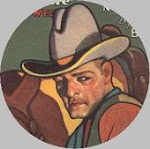I found this TV-show tie-in novel at PulpFest this summer. It seemed a happy coincidence: Our family has been watching, off and on, seasons' worth of episodes of the show for the past three years thanks to through-the-mail rentals of DVDs and streaming video online. I had no idea a tie-in novel existed for Have Gun, Will Travel, so I was pleased to delve in to see how the prose Paladin compared to the phosphor-dot Paladin; and the book gave me the opportunity to finally read a western by Noel Loomis.
Just as most of the episodes begin in San Francisco, so does this novel. The first several chapters, in fact, take place there as Paladin encounters a flamboyant actress and some menacing gents who seem to follow Paladin and the actress around but demonstrate no clear association with the woman. This bit of mystery stirs Paladin's attention, of course, as does the seeming connection between the actress' recent visit to Santa Fe and a request for Paladin's help that originates from that same town.
A foiled stage coach robbery, a run-in with attacking Indians and a chase by Mexican bandits all seem somehow connected to Paladin when he learns that the woman who has requested his help—Mrs. Marsh—wants him to find her husband. The husband, Joe, runs a newspaper in Santa Fe, but has stirred up suspicion against a local rancher, Whipple, by accusing him of gun running to Mexican revolutionaries. Joe has disappeared in Mexico, supposedly joining the revolutionaries there. Paladin finds all this somewhat confusing, since Mrs. March apparently loves her husband, but allows Whipple to court her.
A trip into Mexico turns deadly as Paladin joins a revolutionary camp and finds Joe Marsh. The latter is an idealist who imagines the revolutionaries will bring freedom to Mexico, but he is blind to the ugly banditry demonstrated by his fellows.
Paladin ties up all the loose ends by the last page, of course.
Loomis captures the onscreen persona of Paladin very well. I could easily imagine some of the dialog as spoken by Richard Boone in his black attire. There are, of course, the spot-on moments of Paladin demonstrating his higher learning and his sardonic commentary on the activities of his companions—both the apparent good guys and and obvious bad guys.
Whether this is a good sample of Loomis' work is hard to say: work-for-hire tie-ins don't necessarily show off a writer's typical style or concerns, but one can easily argue that a given writer would be chosen for a project because his style and concerns closely match those of the property for which he would be writing a novel. I suppose I'll have to read more by Loomis to find out whether that's true.
The Last Line - Stephen Ronson
12 hours ago





